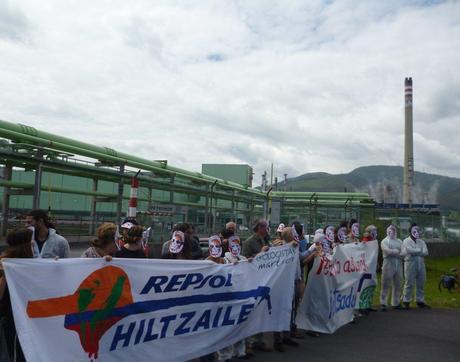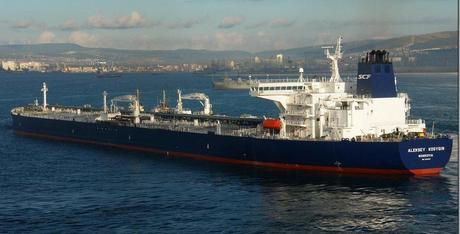from DeSmogBlog and ekologistak martxan 
Protests erupted in Spain last week at the site of the first major delivery of tar sands crude imported from Canada via the United States.
According to a news report by EurActiv.com, an online news service focused on EU affairs, 600,000 barrels of Western Canada Select (WCS) crude were due to arrive at the port of Bilbao, Spain, imported by the Spanish oil company Repsol. According to MarineTraffic.com data on the tanker’s location, it appears the delivery at Bilbao occurred on 29-30 May.
The Spanish oil giant is using this delivery as ‘a test’ to determine if future bulk deliveries are feasible.
On 29 May, about 50 protesters staged a demonstration outside Repsol’s Bilbao refinery, after rumours spread that the dirty fuel shipment had already arrived.
The protesters, including local residents and environmentalists from all over Europe, have vowed to increase the scope and organization of the protests if shipments continue.
“This was just the first mobilisation,” said Mariano González, a spokesman for Ecologistas en Acción, a Madrid-based coalition of Spanish environmental organizations. “We are now in contact with the local citizens platforms who don’t agree with the pollution, and we expect to strengthen our activities, and organize bigger protests against any future shipments.”
Thousands of people live around the refinery and Gonzalez did not rule out diverse tactics to try to halt the heavy crude delivery. “We are very proud of the action,” he said, “but if we had had more time to organise, we would have tried to do something with more people that would have had more repercussions and impact.”
The Repsol “test” delivery illustrates the potential for a massive increase in the burning of Canadian oilsands crude by Europe, with particular relevance for the pending northern leg of the Keystone XL pipeline. If the pipeline is fully completed, Europe may begin importing some 700,000 barrels per day — up significantly from the current rate of about 4,000 bpd.
Citing the high greenhouse gas potency of Canadian oilsands oil, climate activists are outraged by the planned imports. “This would totally undermine the (greenhouse gas) reductions that the EU is aiming at,” said Franziska Achterberg, Greenpeace EU energy and transport policy director.
The Congressional Research Service produced a detailed analysis of greenhouse gas emission potential from Canadian oil sands crude in March 2014, concluding that:
“Canadian oil sands crudes are generally more GHG emission-intensive than other crudes they may displace in U.S. refineries, and emit an estimated 17 per cent more GHGs on a life-cycle basis than the average barrel of crude oil refined in the United States.”
In addition, Western Canadian Select crude has such high sulfur and residual metals levels that it requires specially modified refineries to process.
The Financial Post (Canada) reports that the Repsol delivery to Spain was exported from U.S. terminals. A provision in U.S. law called the Jones Act allows for re-export of certain Canadian crudes from U.S. ports, even as U.S. crudes are prohibited from export.
The Repsol delivery was loaded in Freeport, Texas, “after gaining license to export,” according to the FP report.
The crude oil tanker “Aleksey Kosygin” was contracted by Spanish oil giant Repsol to transport the Canadian crude to Bilboa, Spain via Texas, in the first major delivery of Canadian tar sands crude to Europe.


